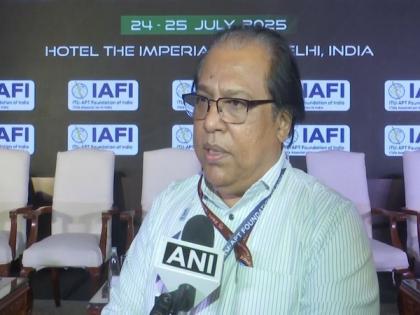FDI fueling telecom innovation; satellite internet key for rural India: Department Of Telecommunications (DoT) Advisor
By ANI | Updated: July 25, 2025 17:49 IST2025-07-25T17:43:09+5:302025-07-25T17:49:28+5:30
New Delhi [India], July 25 : Pointing to the fact that 100 per cent FDI is already allowed in ...

FDI fueling telecom innovation; satellite internet key for rural India: Department Of Telecommunications (DoT) Advisor
New Delhi [India], July 25 : Pointing to the fact that 100 per cent FDI is already allowed in the telecom sector in India, Deb Kumar Chakrabarti, an Advisor at Department of Telecommunications (DoT) said that the country has been doing very well in this technology domain.
"Lots of FDI basically have come from the telecom sector. FDI is not just money. FDI is technology. There are new management styles, many things that come into a new country. So, that way I think every country benefits if it gets a big share of FDI," the DoT official toldon the sidelines of the 2nd India Space Policy Conference here in the national capital.
Asked about the reforms made in the technology domain, particularly in the telecommunications, and what new innovations have been brought in, he, without getting into much specifics, said the government or the department are always technology agnostic.
"It never talks up any particular technology to be brought in or not to be brought in. We are always welcoming technology. Because it gives a bigger choice to the consumers, which is ultimately it will be doing good only the common users of the telecom services so that way it's always good to have more and more choices in the market," he asserted.
Speaking about demand for satellite internet services in India, he said that it will have good use cases in places where current telecom technologies are difficult to install.
"It (demand for satellite internet services) will be growing, because there is a good amount of areas, but mostly in the village, rural and very distant areas where extending normal modes of communication like optical fibre or the microwave, it is very difficult, so I think that (there) satellite services could be an ideal replacement in those areas, and the more these satellite services are getting customised for this type of requirements I mean the size is reducing, the cost is reducing, no extra devices may be required in the future," he supplemented. "The simple smart phone may be sufficient to work on D2D type of services. I think it (satellite internet services) will have wider acceptance in the Indian market as well."
Going ahead, he said India will also look at manufacturing goods needed for satellite internet services.
"India has in a big way (wanting) to become a manufacturing nation. Call it satellite or any other technology, and if you see the new telecom policy 2025, which has been published very recently for the public consultation. There, we have declared that becoming a manufacturing nation, it's a mission for the Department of Telecom. In the coming five years, I think the department aggressively will be working towards that mission," he added.
Bharat Bhatia, President, ITU-APT Foundation of India (IAFI), talking to ANI, said this two-day space policy conference has been one of the most successful events.
"The sessions were very detailed and very elaborate. We went through a session on D2D today, then the 2nd day. And very intensively discussed all aspects of spectrum policy, regulation, market demand, all aspects of D2D have been discussed in a very detailed panel, with the participants from the government, from the industry, from the satellite operators, from the chip operators, and I believe this today conference itself has been one of the very successful events," Bhatia said.
"Our aim is to bring all the stakeholders on one platform, make sure that there is a continuous dialogue between the policymakers and between the industry, between the operators, between the chip vendors, between the ecosystem. So the whole idea of this conference is to get everybody on the same platform. Thrash out whatever the issues are there and make sure that India moves forward. The session, the last session that we had today on the Viksit Bharat, that session really provided a way forward. How do we make India a developed country by 2047, and that particular session really stole the thunder, because we are trying to use the satellite technologies to make India a developed country," he further said.
According to IAFI website, it is working for last 20 years with the prime objective of encouraging involvement of professionals, corporate, public and private sector industries, R&D organizations, academic institutions, and such other agencies engaged in development of ICT sector, in the activities of the International Telecommunication Union (ITU) and the Asia Pacific Telecommunity (APT).
On Day 1 of the conference, Thursday, Bharat Bhatia had applauded the opening up of the Indian space sector, adding that it holds immense potential for job creation and new investments.
"India has opened up the space to the private sector and the way the policy has evolved, it is going to bring in a lot of new jobs, a lot of new investment," Bhatia had said.
In India, the space sector was liberalised in 2020, and private sector was allowed to carry out end to end space activities. Indian National Space Promotion and Authorization Centre (IN-SPACe) was created in Department of Space for promoting, authorising and overseeing the activities of Non-Government Entities (NGEs) in space sector.
Disclaimer: This post has been auto-published from an agency feed without any modifications to the text and has not been reviewed by an editor
Open in app